
Ancestry of Abdullah family in Damascus
We narrate here aspects of the life of our late grandfather Hassan Abdullah, and the reasons behind his emigration from Algeria. And we proudly showcase the family tree of our ancestors that he brought with him on his journey to start a new life in Damascus, leaving behind the rest of his extended family in the shadow of the French colonialism in Algeria.
One might think that the genealogical tree is of no value, but if we look closely and reflect on the systematic brutality that the French colonizers imposed in an attempt to erase their subject peoples’ heritage, altering their names, customs, language and beliefs, we will understand what drove the orphan kid who was our grandfather to take the difficult path of emigration, holding on only to a manuscript that contained his ancestors’ names, their travel stories and their history, written in Arabic, against which, and against their Islamic culture, the Europeans had declared ferocious war.
Due to a lack of stability and safety in the countries of the Levant, many descendants of this Algerian immigrant later left Syria and now live in various parts of the world. Some of his grandchildren do not know much about their lineage, and some of them don’t even speak their ancestor’s language. Thus, we took it upon ourselves to present, as his legacy, this document, which he devotedly preserved until his death.
We also present some of the difficulties our grandfather had to endure in those difficult times, including his lack of understanding of the colonists’ language, having to serve in their occupying army, and dealing with their courts and the laws they imposed on him. All this was at a time full of momentous events from the collapse of the Ottoman Empire, trough both world wars, during which poverty he was subjected to poverty, epidemics and death of his loved ones.
This site is mainly dedicated to the offspring of Hassan Abdullah, but we welcome all visitors, especially those who may be related to us or who are from those families who still live in the land of AL Maghreb, Egypt, Damascus or Jerusalem whether Arabs, native Amazigh, Berber or Kabyle people, who might have been mentioned in the genealogy tree.
We have translated some parts of the site into English so that descendants who do not read Arabic [1] [2] can learn about their origins.
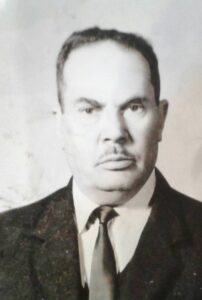
Our grandfather, Hassan Abdullah bin Ali bin Al-Hajj Ali

This manuscript, containing our genealogical tree, was carefully wrapped and preserved in a metal cylinder that our grandfather Hassan Abdullah bin Ali bin Al-Hajj Ali (1905 – 1973) wore hanging from a chain around his neck during his migration.
After his parents’ death, his aunt took care of him. When he was eight years old, she decided to immigrate with her nephew to Damascus. She probably decided to seek refuge in Damascus because there was a trend toward immigration to the Levant from the Maghreb , and the Islamic world more broadly, in the decades following the 1830 French coloned Algeria and declared it to be “French Algeria.”
Algerians were subjected by the French to oppression, imprisonment, elimination and displacement if they resisted or rejected their colonizers. But they did resist, revolt, and sacrifice continuously for 136 years from the time the French invasion began. Prince Abdul Qadir al-Djazairi was elected as a leader for all of the Algerian tribes to lead the resistance in 1832. Lalla Fatma N’Soumer led her popular revolution beginning in 1854, and Sheikh al-Moqrani led a revolution in 1871.
After a long struggle, Prince Abdul Qadir al-Djazairi was captured and exiled to Damascus with his family, comrades and their families. This triggered a wave of immigration to the Levant, especially after France decided that Algerian men should serve in the French army and be sent to its many other colonies. Christianization campaigns, the obliteration of national identity, poverty and heavy taxation also factored into the immigration decision for many, who were concerned for their safety and longed to preserve their culture, identity and beliefs.
Hassan Abdullah was born in the Kabyle tribes of the district of Azazga in the province of Tizi Ouzou. As a child he spoke the Berber language. It is said that his parents, Ali and Dahabeeyah, died when he was quite young as a result of violent incidents that occurred among Kabayl Berber tribes. His aunt, the sister of his father, then fled with him to nearby Kabyle Mountains, where she stayed for some time. Then aunt and nephew emigrated to Damascus, where a large Algerian community had already settled. The Ottoman authorities in Syria at the time assisted Algerians in settling in Nola, a small village at Al Ghouta, and provided them with aid and housing after receiving guarantees that they would maintain their loyalty to the Ottoman state and abide by its laws.
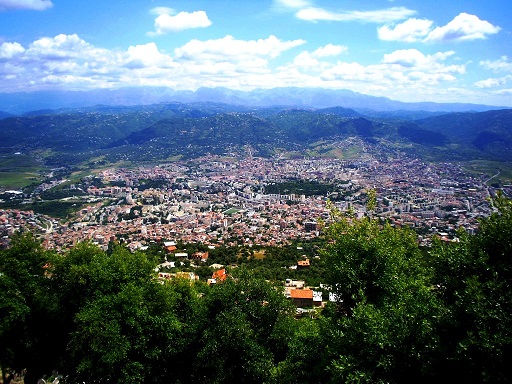
Other Algerian immigrants chose to settle in Damascus in what was later called the Maghrebi quarters. Growing up, Hassan Abdulla travelled between the two communities on horseback, until he eventually married and settled in the Maghrebi quarters and became briefly the temporary community mayor after the passing of his father in law Mahmoud Othman Pasha
Throughout his life until his death, Hassan Abdullah preserved his inherited family tree. He made sure no one would remove it from its container without sacrificing an animal to the poor. Following this tradition, his children and grandchildren are still taking care of it to this day.
Here we present photos we took of the genealogical tree during one of our visits to Damascus in 2010.
Our grandfather’s original metal cylinder which contained the genealogical tree manuscript
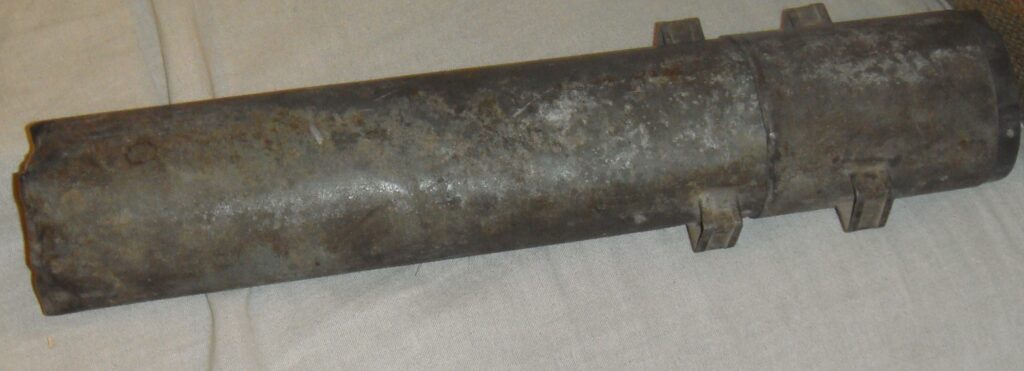
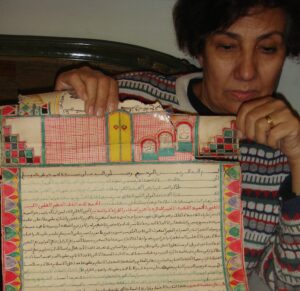
Mrs. Aziza, attorney of law, eldest daughter of Hassan Abdullah, holding her family tree in Damascus 2010
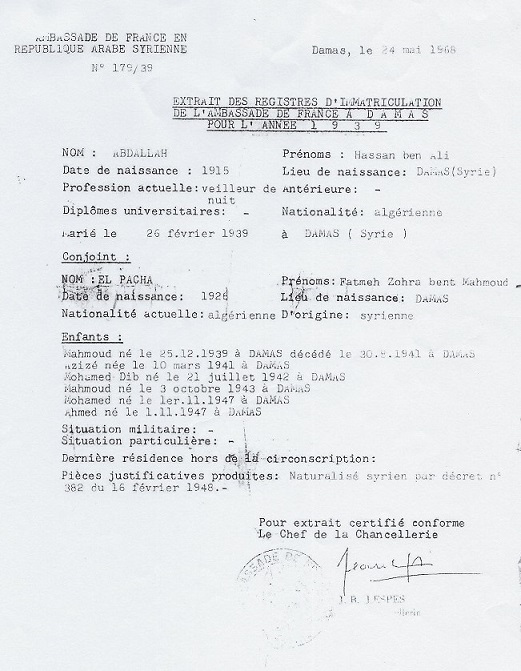
The French colonial regime systematically obliterated the Algerian civil records and changed family names on record. This resulted in suffering that is felt still today by the families who lost records of their lineage. After Algerian independence, the French brought existing records to France and to this day have procrastinated in releasing them to Algerian authorities. This underscores the importance of this genealogy tree that our grandfather brought with him to Damascus, fleeing from the tyranny of an occupation that worked diligently to erase the Algerian people’s heritage.
The civil record shown, produced by the French embassy in Damascus, represents typical colonialist behavior in the document’s having been issued in the colonizers’ language instead of Arabic. Our grandfather did not understand what was written in the document, which shows errors in the place and date of his birth.
Fatima Al-Zahra, the wife of Hassan Abdullah
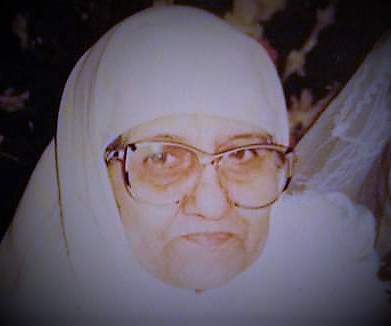
Fatima al-Zahra al- Pacha (1925-1999) and her brother Muhammad Zuhair al- Pacha (1931-2019) were born in Damascus to an Algerian immigrant father named Mahmoud Othman al- Pacha Al-Jazaery (1889-1958) and a Syrian-Damascus mother named Aziza Ghelban (1900-1982).
Fatima al-Zahra was the second wife of our grandfather, Hassan Abdullah. She bore him fifteen children. One may think this large number of children excessive, but it may become understandable if we recall that Hassan Abdullah, the orphan immigrant, had suffered significantly in losing all his family in Algeria and then losing his first wife, Fatima bint Muhammad bin Ali Said Jazairi, his eldest son Mahmoud and his daughter Fawzia, due to the lack of health services during the French colonial era. He and his second wife, Fatima al-Zahra, had many children, hoping that some of them would survive. Indeed, only one son and one daughter died, and the rest survived, probably due to the improved medical conditions after Syrian independence. Despite limited family resources, the children, sons and daughters alike, grew up and went to school. Some of them graduated from Damascus University. These sons and daughters gave birth to numerous grandchildren who, in turn, have spread across the globe, some on ‘death boats‘ operated by human traffickers, because of the cruelty of life and, in some cases, because of the endless wars that are still being carried on by the former colonizers and their allies.
Algerians from Algeria and French Algerians, French courts on Syrian soil
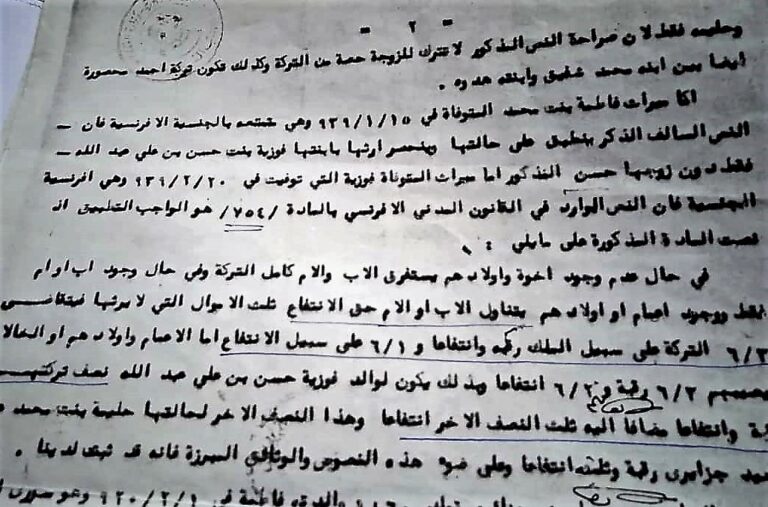
After the death of his first wife and the son and daughter he had by her, our grandfather, Hassan Abdullah, tried to take possession of a parcel of land in Noula village at al- Ghouta, east of Damascus, that he had inherited from his first wife, Fatima (of French nationality 1911 – 1939), and his daughter Fawzia (also French), who died two months after her mother in 1939). This land was part of a larger parcel his wife had inherited from her father, Muhammad bin Ali (Algerian 1888 – 1924 — son of Ali bin Said BelEid, also Algerian, 1860 – 1920), who was married to a woman named Fadda (French).
At that time, all Algerian immigrants were regarded as aliens in Syria. Some were considered to be Algerians, some to be French but, in either case, French inheritance law, instead of the Islamic inheritance law, was applied because Syria itself was then controlled by France under a League of Nations mandate.
After Syria achieved independence and the French colonizer had departed, Syrian citizenship was granted to Algerian immigrants who wished to remain, and Syrian inheritance law was enacted in line with Islamic inheritance laws, which had been in force in the region for 1400 years.
In 1969, our grandfather reapplied for his inheritance before the Syrian courts. It seems, however, that the courts of Syria, like the courts of the colonialists, have so far continued to obstruct the transfer of land ownership.*
Application before the Syrian Courts in 1969
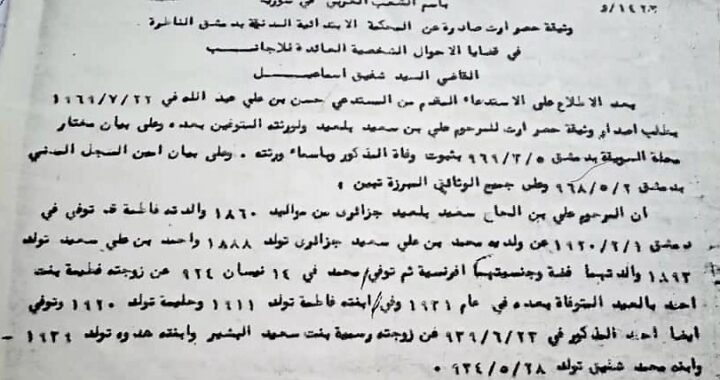
* After a series of failed attempts over many years, Hassan Abdullah’s heirs remain unable to take possession of their inherited lands due to many other conflicting Syrian laws.
Mahmoud Othman Pasha, the Algerian
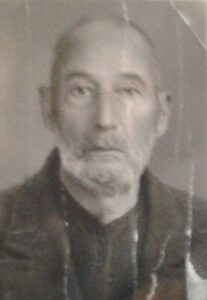
Born in the city of Mecca in the year of 1889, Mahmoud Othman Pasha was the father of Fatima al-Zahra al-Pacha, Muhammad Zuhair al- Pacha. He served as the mayor of the Maghreb community in Damascus. Mahmoud Pasha had fled from the state of Tébessa in Algeria to Beirut by sea, and travelled on horseback from there to Damascus, where he resided until his death in 1958 in its Maghrebi quarters. He had been forced to leave Algeria in haste due to a looming danger of being arrested by the occupying French forces since he was known to have continuously assisted Algerian revolutionaries, and especially because he was from a family of feudal land-owners descended from the notables and nobles of Ottoman Algeria.
Mahmoud Othman Pacha married a Damascene woman named Aziza Ghalban (1900-1982), who had been married to someone else when she was young. She had separated from her first husband because of his mistreatment without their having had any children together.
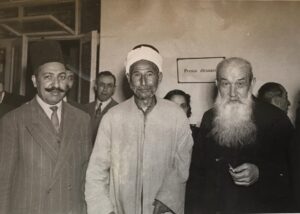
Mahmoud Pacha left his older brother, Alawa Othman Pacha, behind in Tébessa. Alawa Pacha had only one daughter and a granddaughter named Fawzia Ibn Abbas. Mahmoud Pacha entrusted the management of his properties in Algeria to his secretary, named Kasri Masoud, who maintained the properties in trust and continued to send money transfers from property revenues to Mahmoud Pacha in Damascus until the socialist government of independent Algeria banned the issuance of transfers abroad.
The son and daughter of Mahmoud Pacha tried to recover the lands and properties scattered around Tébessa and Constantine, but the son of the agent Kasri Massoud had taken possession of the properties and prevented the transfer of the inheritance by means of many influential acquaintances he had in the corrupt government of Algeria.
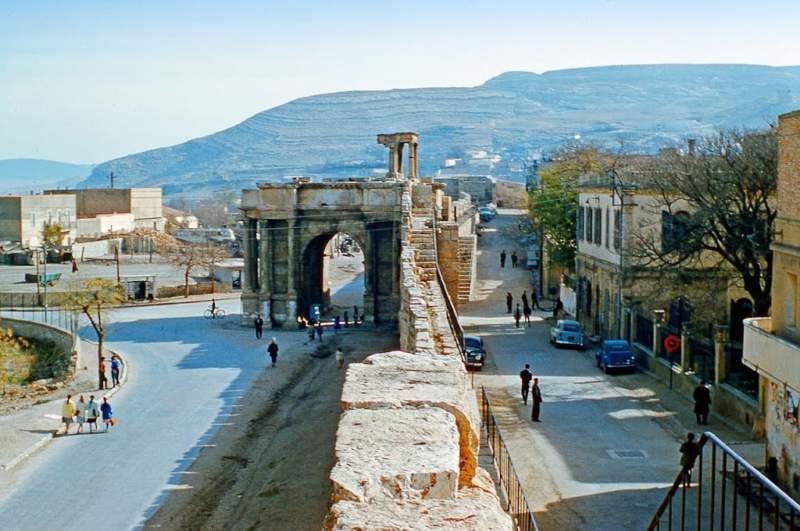
Mahmoud Othman Pacha worked his entire life as the mayor (Mukhtar – مختار) of the Maghrebi community in Damascus, ensuring the wellbeing and safety of his district. It is reported that he used pseudonyms in community records to deceive the occupying French forces when they were searching for someone. He kept the real records in his house, and these were later used to include the Algerian community in the records of the Syrian state after its independence.
Mahmoud Pacha died and was buried in Damascus in 1958 before the independence of Algeria in 1962. Our grandfather, Hassan Abdullah, visited his grave in the cemetery of Al-Bab Al-Saghir to tell him, as he had requested in his will, that Algeria had gained its freedom and that his Algerian community was celebrating Algerian independence in the streets of Damascus.
Successful immigrants, well integrated into their new community
After the Great Arab Revolt and the division of the Levant countries under the terms of the scurrilous Sykes-Picot agreement, France occupied Syria and partitioned part of it as the separate state of Lebanon. Thus, French colonialism managed to catch up with our grandfather who had fled to Syria to escape French control in the first place.
The French colonizers of the Levant decided to subject Maghrebi immigrants there to French military service, against their will, because France considered these people to be its own subjects as citizens of French Algeria.
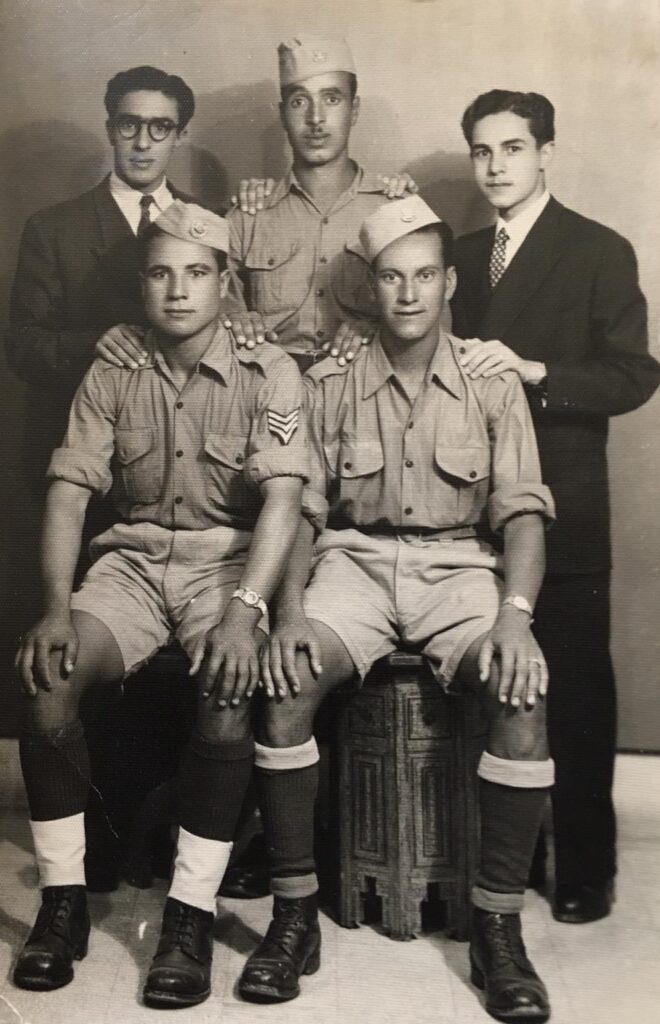
Hassan Abdullah was sent to Burj al-Qishla (the seat of the French Mandate government, currently the Grand Serail in Beirut) to serve in the French army. Later on, he was deployed to Masyaf in Syria amid popular rejection of the occupation. Fearing for their lives, our grandfather and his army comrades pointed stove pipes out of window openings, hoping that locals would think these pipes were cannons.
When France’s defeat by Germany loomed on the horizon, Maghrebi soldiers, including our grandfather Hassan Abdallah, deserted their posts.
They are all among the Algerians of Damascus
To the far left is the educator and author Muhammad Zuhair Al-Pacha (1931 – 2019), who died in exile in the United States of America, and to the far rightis the lawyer Ahmed Al-Hasani, who was a prominent figure in Damascus. Both were related to our grandmother Fatima al-Zahra Al-Pacha.
In the center are three Algerian soldiers of the French army of occupation. Among them, to the far left,is Mahmoud al-Issawi.
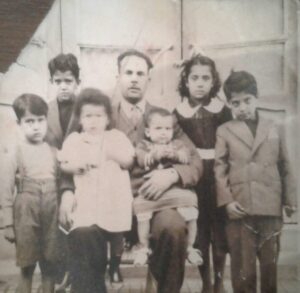
Wars have arisen, people have been displaced, their rights have been violated and their belongings damaged or lost, but we will always have what is most important of all: a legacy written by our ancestors to let us know who we are and where we came from, and to tell us the stories of our long-gone ancestors for over a period of 1400 years.
So how do the children of Hassan Abdullah and Fatima al-Zahra al-Pacha identify themselves?
We’ve asked this question many times, and the answer has always been consistent: “I’m Syrian” or something like “I’m from the Levant (meaning Damascus)”, followed by clarification: “I grew up in the Maghrebi neighborhood of Damascus, because I’m of Algerian origin.”
– Are you Arab?
– “Yes. Maybe. I think I’m also Berber. When we were young, our father used to speak Kabyle with his Algerian friends, not Arabic. We didn’t understand a word, neither did our mother. What I know is that I was born in Syria to Algerian parents. Our mother’s mother was from Sham (Damascus), so she was Syrian, but her husband, our mother’s father, was an Algerian Pacha from Tébessa. He may be of Arab origin or he may be from the Karaghella people, but our mother’s paternal ancestors were born and died in Algeria. We had not known precisely what our ethnic origin was, because we never asked. We’ve just knew that we were Syrians of Algerian origins. To resolve this puzzle, one of Hassan Abdallah’s offspring took a DNA test. The result confirms that the Abdullah family in Damascus is mainly descended from the Amazigh tribes (Kabyle) that have been settled in Tizi Ouzou for the past two hundred years at least.
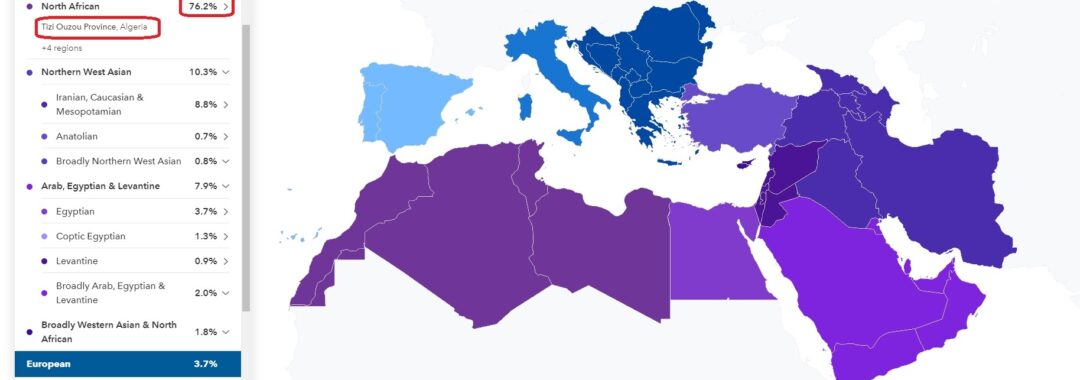
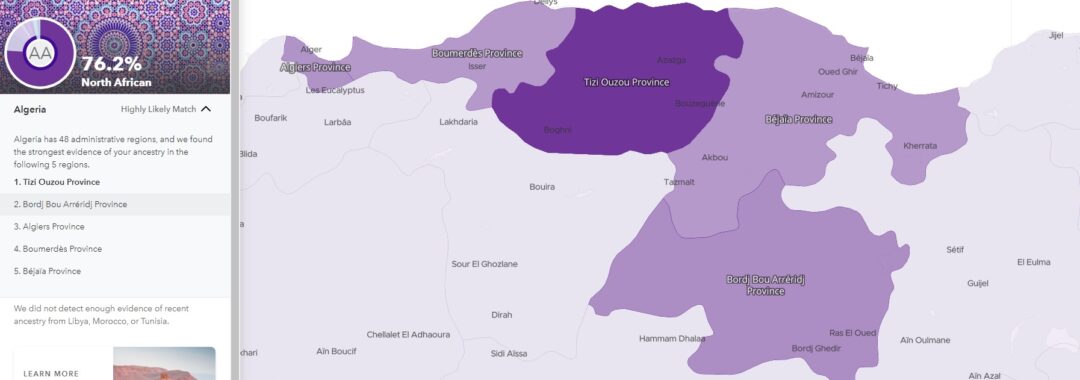
Join us in discovering this this legacy document. Share your thoughts, and contact us. We would love to hear from you.
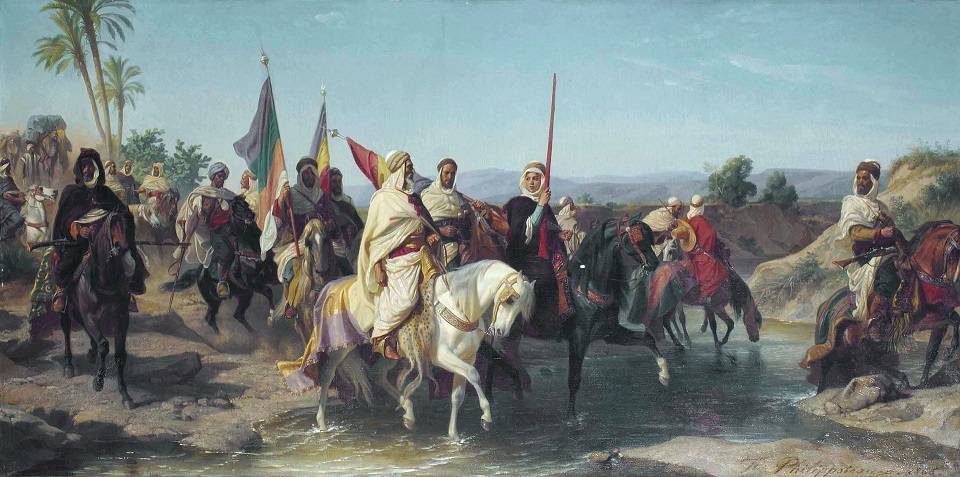
Recent Comments